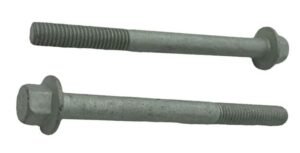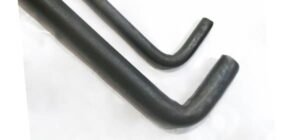Picture this: you’ve just finished a major project, and you’ve used what you thought were rust-proof stainless steel screws to secure everything. Fast forward a few months, and you start seeing little rust stains creeping around those screws. Isn’t that annoying? So, let’s get to the bottom of this – do stainless steel screws really rust?
Stainless steel screws are highly resistant to rust due to their chromium oxide layer but are not entirely rust-proof. In environments with limited oxygen, high contamination, or mechanical damage, rust can still occur. Selecting the right grade of stainless steel and maintaining the fasteners properly can help ensure their longevity and resistance to rust.
Let’s explore why they resist rust and understand their lifespan and popular uses.

Why Stainless Steel Screws Resist Rust?
One of the main reasons stainless steel concrete screws resist rust is due to their chromium oxide layer. Stainless steel contains chromium, which forms a thin, invisible layer of chromium oxide on the surface. This layer prevents oxygen and moisture from reaching the underlying metal, thus protecting it from corrosion.
Additionally, the alloy composition of stainless steel, including chromium, nickel, and sometimes molybdenum, enhances its corrosion resistance. For example, 316 stainless steel contains molybdenum, which provides extra resistance to chloride environments like saltwater.

What is the lifespan of a stainless steel screw?
Stainless steel screws are designed to be highly resistant to rust and corrosion, offering a long lifespan that can extend over several decades, especially when proper grade selection, installation, and maintenance practices are followed. The specific lifespan will vary based on environmental conditions, mechanical handling, and regular upkeep.
5 Reasons Why Stainless Steel Fasteners Are Popular
- Corrosion Resistance: Stainless steel fasteners are highly resistant to corrosion due to their chromium oxide layer, making them ideal for harsh environments, including marine and coastal areas.
- Strength and Durability: Stainless steel fasteners offer high strength and durability, suitable for a wide range of applications. Elements like molybdenum in some grades enhance their strength.
- Versatility: Available in various grades (e.g., 304, 316), stainless steel fasteners cater to specific needs, making them versatile across different industries.
- Low Maintenance: Their corrosion resistance reduces the need for frequent maintenance, lowering long-term costs and minimizing the need for replacements.
- Aesthetic Appeal: Stainless steel’s clean, modern appearance makes it desirable for visible applications, maintaining its look over time and enhancing the overall aesthetic of the finished product.
As a result, stainless steel fasteners are used in many applications across many industries, including, but not limited to, construction, marine environments, food service, and general manufacturing.

When Should You Use Stainless Steel Screws?
Here are some key situations where stainless steel screws are typically required:
- Marine and Coastal Environments: Stainless steel screws, especially grade 316, are ideal for salty and coastal areas due to their superior corrosion resistance compared to other materials.
- Outdoor Applications: For any outdoor project exposed to moisture, rain, and weather, stainless steel screws provide long-lasting rust resistance.
- High Humidity Areas: In high-humidity environments like bathrooms, kitchens, or tropical climates, stainless steel screws help prevent rust and corrosion.
- Chemical Exposure: Stainless steel resists many corrosive substances, making it suitable for fasteners exposed to chemicals or pollutants.
- Food and Beverage Industry: Due to their corrosion resistance and ease of cleaning, stainless steel screws are often required in food processing equipment and facilities.
- Medical and Laboratory Settings: Stainless steel’s cleanliness and corrosion resistance make it ideal for medical instruments and laboratory equipment.
- Aesthetic Considerations: When the appearance of fasteners is important, stainless steel offers a clean, attractive look that resists tarnishing.
- Long-Term Durability: For applications where long-term integrity is crucial and frequent replacements are impractical or costly, stainless steel screws provide longevity.
- Chlorine Environments: In areas around swimming pools or other chlorine-rich environments, higher-grade stainless steel like 316 is necessary to resist chloride-induced corrosion.
- Galvanic Corrosion Issues: When fastening dissimilar metals, stainless steel helps minimize galvanic corrosion.

When Should You Avoid Using Stainless Steel Screws?
Despite their many advantages, stainless steel screws may not be suitable for all situations:
- High-Stress Applications: Stainless steel is generally softer than hardened steel. In applications requiring high tensile strength or where screws will face significant shear forces, stainless steel screws may not be strong enough and could fail under stress.
- Cost Considerations: Stainless steel screws are more expensive than other types, such as galvanized or coated screws. For budget-sensitive projects, cheaper alternatives might be more practical.
- Gall Risk: Stainless steel is prone to galling, a form of wear caused by adhesion between sliding surfaces. In applications with frequent tightening and loosening, galling can damage threads and make screws difficult to remove.
- Crevice Corrosion: Stainless steel depends on oxygen to maintain its protective chromium oxide layer. In environments where oxygen is restricted, such as tight crevices, the layer of protection can break down, leading to crevice corrosion.
- Chemical Exposure: Although resistant to many corrosive substances, stainless steel can succumb to certain chemicals, like chlorides. In areas with high chloride levels, such as swimming pools or coastal regions, even stainless steel can corrode.
Stainless steel screws are not always the best choice in high-stress applications, cost-sensitive projects, situations prone to galling, environments with limited oxygen, or areas with high chloride concentrations. Understanding these limitations can help in selecting the most appropriate fasteners for specific applications.
Conclusion
In conclusion, while stainless steel screws are highly resistant to rust and corrosion, they are not entirely immune. Understanding their strengths and limitations helps in selecting the right fastener for your project. With proper care and the right grade, stainless steel screws can provide long-lasting, reliable performance.
At Shanghai Hengrui Industry Co., Ltd, we pride ourselves on delivering top-quality stainless steel screws to meet your specific needs. contact us today or request a quote for pricing.






